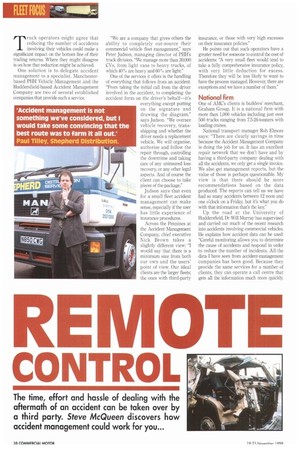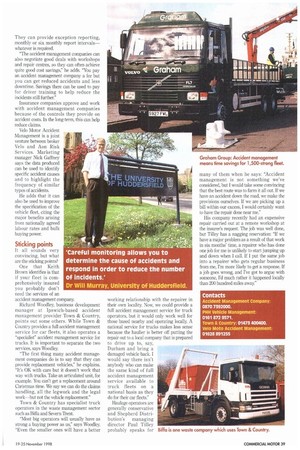I;Z MOT
Page 40

Page 41

If you've noticed an error in this article please click here to report it so we can fix it.
CONTROL
The time, effort and hassle of dealing with the aftermath of an accident can be taken over by a third party. Steve McQueen discovers how accident management could work for you...
Truck operators might agree that reducing the number of accidents involving their vehicles could make a significant impact on the bottom line of their trading returns. Where they might disagree is on how that reduction might be achieved.
One solution is to delegate accident management to a specialist. Manchesterbased PHH Vehicle Management and the Huddersfield-based Accident Management Company are two of several established companies that provide such a service. "We are a company that gives others the ability to completely out-source their commercial vehicle fleet management," says Peter Judson, managing director of PHH's truck division. "We manage more than 30,000 CVs, from light vans to heavy trucks, of which 40% are heavy and 60% are light."
One of the services it offers is the handling of everything that follows from an accident. "From taking the initial call from the driver involved in the accident, to completing the accident form on the driver's behalf—it's everything except putting on the signature and drawing the diagram," says Judson. "We oversee vehicle recovery, transshipping and whether the driver needs a replacement vehitle. We will organise, authorise and follow the repair through, controlling the downtime and taking care of any uninsured loss recovery, or any other legal aspects. And of course the client can choose to take pieces of the package."
Judson says that even for a small fleet accident management can make sense, especially if the user
0114 has little experience of insurance procedures.
Across the Pennines at the Accident Management Company, chief executive Nick Brown takes a slightly different view: "I would say that there is a minimum size from both our own and the users' point of view. Our ideal clients are the larger fleets; the ones with third-party insurance, or those with very high excesses on their insurance policies."
He points out that such operators have a greater need for someone to control the cost of accidents: "A very small fleet would tend to take a fully comprehensive insurance policy, with very little deduction for excess. Therefore they will be less likely to want to have the process managed. However, there are exceptions and we have a number of them."
National firm
One of AMC's clients is builders' merchant, Graham Group. It is a national firm with more than 1,000 vehicles including just over 500 trucks ranging from 7.5-26-tonners with loading cranes.
National transport manager Rob Elmore says: "There are clearly savings in time because the Accident Management Company is doing the job for us. It has an excellent repair network that we don't have and by having a third-party company dealing with all the accidents, we only get a single invoice. We also get management reports, but the value of those is perhaps questionable. My view is that there should be more recommendations based on the data produced. The reports can tell us we have had so many accidents between 12 nom and one o'clock on a Friday, but it's what you do with that information that's the key."
Up the road at the University of Huddersfield, Dr Will Murray has supervised and carried out much of the recent research into accidents involving commercial vehicles. He explains how accident data can be used: "Careful monitoring allows you to determine the cause of accidents and respond in order to reduce the number of incidents. All the data I have seen from accident-management companies has been good. Because they provide the same services for a number of clients, they can operate a call centre that gets all the information much more quickly. They can provide exception reporting, monthly or six monthly report intervals— whatever is required.
The accident management companies can also negotiate good deals with workshops and repair centres, so they can often achieve quite good cost savings," he adds. "You pay an accident management company a fee but you can get reduced accidents and less downtime. Savings there can be used to pay for driver training to help reduce the incidents still further."
Insurance companies approve and work with accident management companies because of the controls they provide on accident costa In the long-term, this can help reduce claims.
Velo Motor Accident Management is a joint venture between broker Velo and Aon Risk Services. Marketing manager Nick Gaffney says the data produced can be used to identify specific accident causes and to highlight the frequency of similar types of accidents.
He adds that it can also be used to improve the specification of the vehicle fleet, citing the major benefits arising from nationally agreed labour rates and bulk buying power.
Sticking points
It all sounds very convincing, but what are the sticking points?
One that Keith Brown identifies is that if your fleet is comprehensively insured you probably don't need the services of an accident management company.
Richard Woodley, business development manager at Ipswich-based accident management provider Town & Country, points out some others. While Town & Country provides a full accident management service for car fleets, it also operates a "specialist" accident management service for trucks. It is important to separate the two services, says Woodley.
"The first thing many accident management companies do is to say that they can provide replacement vehicles," he explains. "It's OK with cars but it doesn't work that way with trucks. Take an articulated unit, for example. You can't get a replacement around Christmas time. We say we can do the claims handling, all the legwork and the legal work—but not the vehicle replacement" Town 8: Country has specialist truck operators in the waste management sector such as Biffa and Severn Trent "Most big operators will usually have as strong a buying power as us," says Woodley. "Even the smaller ones will have a better Haulage operators are generally conservative and Shepherd Distri bution's managing director Paul Tilley probably speaks for many of them when he says: "Accident management is not something we've considered, but I would take some convincing that the best route was to farm it all out. If we have an accident down the road, we make the provisions ourselves. If we are picking up a bill within our excess, I would certainly want to have the repair done near me."
His company recently had an expensive repair carried out at a remote workshop at the insurer's request The job was well done, but Tilley has a nagging reservation: "If we have a major problem as a result of that work in six months' time, a repairer who has done one job for me is unlikely to start jumping up and down when I call. If I put the same job into a repairer who gets regular business from me, Fm more likely to get a response. If a job goes wrong, and I've got to argue with someone, I'd much rather it happened locally than 200 hundred miles away."
Contacts
Accident Management Company: 0870 7392000.
PHH Vehicle Management: 0161 872 9571.
Town & Country: 01473 400400. Vela Moto Accident Management: 01628 891255
















































































































